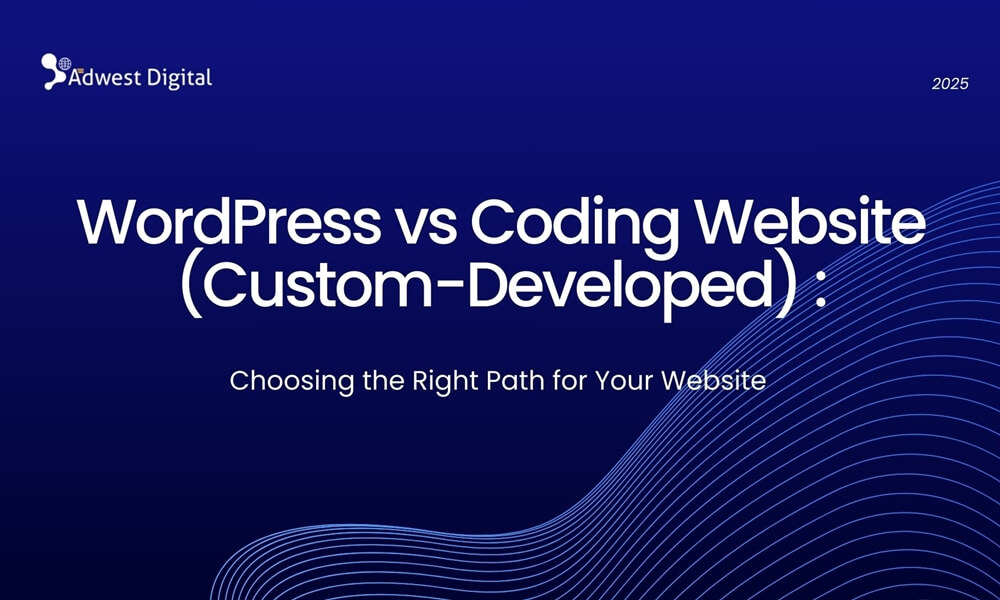WordPress Intro
WordPress has grown far beyond a simple blogging tool; it’s now the backbone of millions of websites across the globe. Its balance of user-friendly design and powerful flexibility makes it ideal for businesses, creatives, and professionals who want a website that works as smoothly behind the scenes as it does on the screen. From sleek portfolios to robust eCommerce stores, WordPress provides a reliable foundation for bringing digital ideas to life.
Custom Coding Intro
Custom coding is where creativity meets precision. Unlike pre-made templates or drag-and-drop builders, it allows you to shape a website from the ground up; every feature, every detail, fully customized to your vision. Whether it’s optimizing performance, building unique functionality, or crafting a design that truly stands apart, custom development ensures your site doesn’t just exist online it stands out with your dream business.
Tech Stack
| Technology | WordPress | Custom Website |
|---|---|---|
| Languages | PHP | PHP / Python / Node.js (All Options Available) |
| Frameworks | – | Laravel / CodeIgniter / Express.js / Django Etc |
| Database | MySQL / MariaDB | MySQL / PostgreSQL / MongoDB |
| Frontend | HTML5, CSS3, JavaScript | Multiple Options Available |
Compression
Building a website is no longer just about putting a few pages online. It’s about creating a digital experience that feels attractive, purposeful, and lasting. WordPress remains a trusted choice for businesses and creators alike, offering flexibility and ease of use. But when paired with custom coding, it transforms from a simple platform into a powerful canvas where design, performance, and functionality come together. Whether you’re looking to refine a blog, launch a business site, or craft a completely scalable solution, the combination of WordPress and custom development gives you the freedom to shape the web on your own terms.
When I Should Use WordPress:
WordPress is the best option when you don't want to sacrifice flexibility. If your goal is to publish content regularly, whether through a blog, a professional portfolio, or a company website - it provides a ready-made structure that allows ideas to move from draft to audience with remarkable ease. It has a huge library of themes and plugins means you can expand your site’s capabilities without rebuilding from the ground up, making it especially suitable for small to medium businesses, creative professionals, and organisations seeking a polished presence without heavy technical overhead.
It is also well-suited to those who anticipate growth. A modest site can begin with a simple layout and later evolve into a full eCommerce store, a membership platform, or a multilingual hub, all without discarding the original foundation. In short, WordPress is most fitting when time, adaptability, and reliable publishing are the chief priorities.
When I Should Use Custom Coding:
Custom coding becomes the wiser path when the ordinary will not suffice. If your project demands features the way you think or that do not exist in ready-made templates or plugins, building from the ground up offers complete authority over how the site functions and performs. It is particularly suited to businesses with complex requirements - such as tailored dashboards, intricate data handling, or unique user interactions- that cannot be met by pre-packaged solutions.
This approach also benefits those who place a premium on precision and longevity. A custom-coded site can be crafted to match exact specifications, optimised for speed, future scalability, and strengthened against vulnerabilities. Moreover, it avoids the bloat of unnecessary add-ons, ensuring that every line of code serves a purpose. In essence, custom development should be chosen when originality, scalability, and technical control matter more than convenience.
Decide Smarter: Match the Approach to Your Website Type
| Type of Website | WordPress | Coding Web | Pros/Cons |
|---|---|---|---|
| Simple Business website | ✔ | ✗ | Pros: Cost saving, Readymade plugins and templates available Cons: Complicated, if you want customization later |
| Customised Business Website | ✗ | ✔ | Pros: Gives freedom to build smartly with a unique brand identity and is fully scalable Cons: It takes more effort to develop it, but don’t worry, hire a professional. |
| Portfolio / Personal site | ✔ | ✗ | Pros: Easy and time-saving Cons: Fewer Cons, you can go ahead with WordPress. |
| Standard/Simple eCommerce | ✔ | ✗ | Pros: Readymade ecommerce template and plugins available Cons: Lots of plugins will make the website slow and issues when you add custom features |
| Unique and Branded eCommerce | ✗ | ✔ | Pros: Flexible, scalable, and built for your brand as an eCommerce website needs for customization Cons: Fewer Cons, Go with coding website |
| Portal Development | ✗ | ✔ | Pros: Custom design, dedicated dashboards, scalable, stand out with a tailor-made solution Cons: None |
| Web Application | ✗ | ✔ | Pros: Custom design, dedicated dashboards, scalable, stand out with a tailor-made solution Cons: None |
| Web app / SaaS | ✗ | ✔ | Pros: Custom design, dedicated dashboards, scalable, stand out with a tailor-made solution Cons: None |
Subscribe
Get the latest blog updates directly in your inbox.


